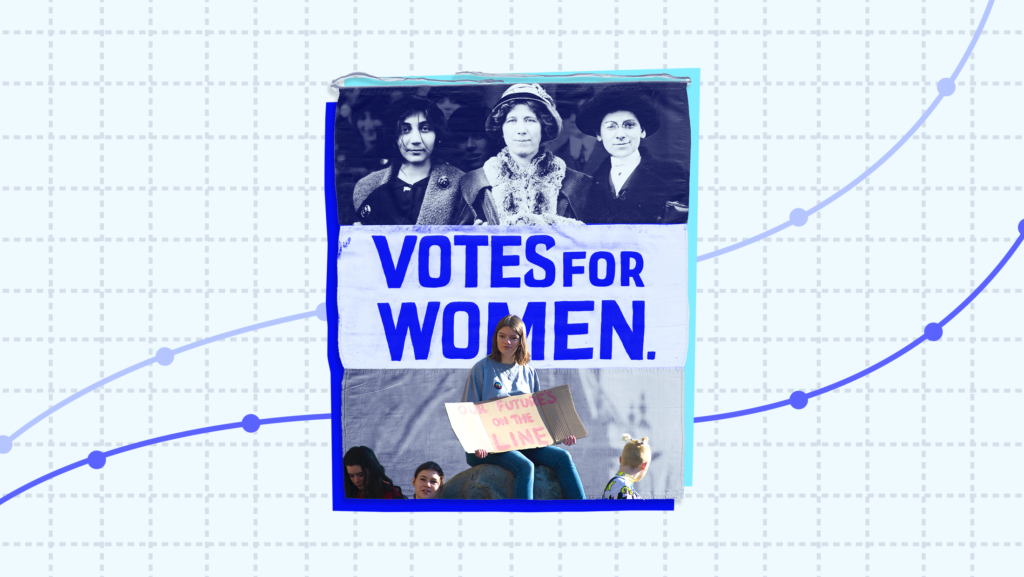101 Years After the 19th Amendment, What’s Next?

On August 18th, 1920, the 19th Amendment granting women the right to vote was ratified and the effect on American democracy was profound. Women would go on to become the majority of eligible voters in the U.S., consistently turning out to the polls at higher rates than men since 1980. But, despite women voters remaining more engaged in elections than their male counterparts, there’s still a major disparity that, over 100 years after women earned the right to vote, Americans are fighting to rectify: Our elected officials are still majority male.
In today’s Data Dive, we’re looking at a study that addresses the next pressing issue for women’s political participation: representation. Despite voting more often, women do not see themselves reflected in political office. Whether it’s a question of access, inspiration, motivation or voter preference, it’s hard for women to get elected in this country — at all levels of government. The research done by political scientists that we’ll dive into today tries to explain why — and outlines what steps could be taken to improve this century’s challenge for women and our democracy.
For women, party matters.
The study we’ll look at, “More Women Candidates: The Effects of Increased Women’s Presence on Political Ambition, Efficacy, and Vote Choice,” primes men and women from the Democratic and Republican parties with information on women’s hypothetical political representation and candidacies and assesses how voters and potential candidates would respond to these various realities. The results are complex, but there are a few key takeaways that stand out.
First, women are more likely to consider running for office in their lifetimes when they hear that other women in their own party are running in higher numbers. This finding aligns with most mainstream discussions of why representation is important: when women see other women like themselves aspiring for political office, they are more likely to do so as well. Interestingly, though, politics does matter: the women in the survey only reported increases in their own political ambition if the heightened representation was within their own party. More Republican women running for office, for example, does not inspire Democratic women voters to take a stab at it themselves.
Democratic women running for office inspires the next wave of candidates — but more work is needed.
Overall, and perhaps unsurprisingly, Democrats of all genders were more likely to vote for women than Republicans. When given the choice between two candidates in their party, one male and one female, Democrats chose the woman 70-75% of the time. Republicans only chose women candidates 50% of the time. However, these statistics are notable because they show a surprising result: men of both parties, on average, slightly preferred women candidates the majority of the time.
So, why do women have such a hard time getting elected? Some data the researchers collected from their control group shines a light on this question. Before receiving any priming information about the success of female candidates, men were twice as likely as women to say they would one day run for office. After being shown that women candidates were running in record numbers, women in the survey group reported a significant increase in their intention to run themselves — but this bump still did not close the ambition gap between women and men.
How can I help close the ambition gap?
The historic gains made by Democratic women in the last few decades has undoubtedly created a domino effect. After nominating the first woman on a major presidential ticket in 2016, Democrats elected a history-making number of women to Congress in the following cycle. Watching other women take the leap and run for office is a vital part of achieving equal gender representation, but women are still less likely to put their name on the ballot than men. To fully close this ambition gap, there’s still work to be done.
Organizations like EMILY’s List, She Should Run, Higher Heights and Run for Something are dedicated to recruiting, funding, training and advocating for women candidates at all levels of government. If you want to help make our government more representative, sign up to volunteer on their websites. Better yet, consider running for office. It may sound overwhelming, but great candidates can come from unexpected places, and you could be next.
Women have made huge strides since they gained the right to vote 101 years ago, but there is still work to be done. Let’s ensure that every room where our laws are written has equal representation for all of us.